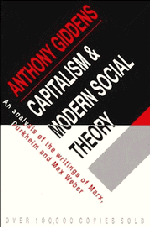Book contents
- Frontmatter
- Contents
- Acknowledgements
- Preface
- Introduction
- List of abbreviations used
- Dedication
- Part 1 Marx
- Part 2 Durkheim
- Part 3 Max Weber
- Part 4 Capitalism, socialism and social theory
- 13 Marx's influence
- 14 Religion, ideology and society
- 15 Social differentiation and the division of labour
- Postscript: Marx and modern sociology
- Bibliography of works cited in text
- Index
14 - Religion, ideology and society
Published online by Cambridge University Press: 05 August 2013
- Frontmatter
- Contents
- Acknowledgements
- Preface
- Introduction
- List of abbreviations used
- Dedication
- Part 1 Marx
- Part 2 Durkheim
- Part 3 Max Weber
- Part 4 Capitalism, socialism and social theory
- 13 Marx's influence
- 14 Religion, ideology and society
- 15 Social differentiation and the division of labour
- Postscript: Marx and modern sociology
- Bibliography of works cited in text
- Index
Summary
Marx's writings have their initial source in the critique of religion as formulated by David Strauss, Bruno Bauer and Feuerbach. Behind these looms the influence of Hegel, whose philosophy, as Feuerbach commented, ‘negated theology in a theological manner’. Hegel's philosophical system unites two basic elements which Marx later identified as characteristic of religion as a form of ‘ideology’: the transmuted representation of values which are in fact created by man in society, and the provision of principled support for an existing social and political order – in this case, that of the Prussian state. The influence of religion upon social life is also a leading concern of both Durkheim and Weber, and forms one most significant dimension along which some of the themes intrinsic to the writings of the latter two authors may be compared with those of Marx. There are two connected sets of problems in the analysis of the ‘ideological’ character of religion which are important here: the derivation of the content of religious symbolism, and the consequences of the ‘secularisation’ of modern life.
The first serves to focus some of the issues involved in the great, protracted debate over the nature of the ‘materialistic’ interpretation of history in the latter part of the nineteenth century. Both Durkheim and Weber, in common with all other liberal critics of Marx, reject what they take to be Marx's conception of the relationship between ideas and ‘material interests’.
- Type
- Chapter
- Information
- Capitalism and Modern Social TheoryAn Analysis of the Writings of Marx, Durkheim and Max Weber, pp. 205 - 223Publisher: Cambridge University PressPrint publication year: 1971



